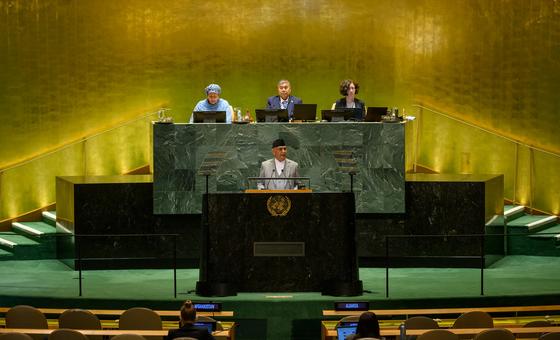The world is at a historic watershed moment, Nepal’s Prime Minister KP Sharma Oli told world leaders at the UN General Assembly on Thursday, with the contrasts between rich and poor, harmony and hatred, and economic development and environmental destruction more evident than ever.
Prime Minister Oli warned of a looming climate catastrophe, resurgent geopolitical rivalries, and escalating military expenditures, which he said are driving the world toward instability.
“Both people and planet stand on the brink of climate catastrophe,” he cautioned, pointing to his country’s vulnerability as one of the most disaster-prone nations in the world.
The Prime Minister also highlighted persistent inequalities between the Global North and the Global South, criticizing the concentration of wealth in developed countries, while poverty and destitution remain entrenched in the least developed countries (LDCs), including Nepal.
Calling for stronger leadership and meaningful cooperation to overcome these disparities, Mr. Oli reiterated the theme of the Assembly’s seventy-ninth session, “Leaving no one behind: acting together for the advancement of peace, sustainable development, and human dignity.”
He also stressed that Nepal has long upheld the principle of inclusivity, enshrined in its Constitution, which guarantees human rights, proportional representation, and social protection for vulnerable communities.
On the international stage, Mr. Oli reaffirmed Nepal’s commitment to peace and non-interference, rooted in the principles of sovereign equality and mutual respect.
The Prime Minister noted Nepal’s unique position as a country that emerged from conflict, having made significant progress in its peace process since the signing of the Comprehensive Peace Accord in 2006.
Citing Nepal’s role as a major contributor to UN peacekeeping missions, he called for greater representation in leadership positions at the Organization, reflect its contribution.
He also underscored the importance of Nepal’s fragile biome, especially the Himalayan region, which plays a critical role in regulating global ecosystems, describing it as a “natural climate stabilizer” vital to maintaining environmental balance.
“Given their significance, it is essential that the mountain agenda receives due attention in climate negotiations,” he urged, while reaffirming Nepal’s commitment to achieving net-zero emissions by 2045.
Mr. Oli also emphasized the need for global action, including adequate financing for climate adaptation and the establishment of a loss and damage fund for vulnerable nations.
While acknowledging the significant challenges the world faces, Mr. Oli expressed optimism about humanity’s potential to overcome them.
“None of the global challenges we face today have been imposed by aliens – these are of our own making,” he said, adding that through understanding, trust, and cooperation, “we can overcome.”
In closing, the Prime Minister invoked the philosophy of Vasudhaiva Kutumbakam from the ancient text Maha Upanishad, the belief that “the world is one family.”
“With this constant conviction, Nepal is committed to playing its role to secure our shared aspiration of enduring peace, progress, and prosperity, while leaving no one behind.”

